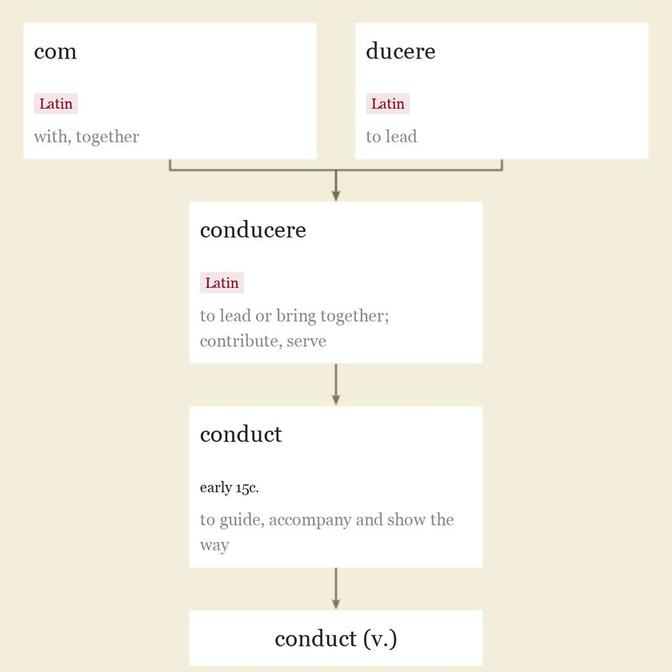conductive (adj.)
1520年代,“具有引导能力或属性”(现已过时),来自 conduct(动词)+ -ive。物理学意义上,“由传导引起或与传导有关”的含义始于1840年。相关词汇: Conductivity(1837年)。
最早记录年份: 1520s
conductive 的相关词汇
conduct (v.)

15世纪初,“引导,陪伴和指路”,源自拉丁语 conducere 的过去分词 conductus,“领导或聚集; 贡献,服务”,来自 com 的同化形式“与,一起”(见 con-) + ducere “领导”(来自 PIE 根 *deuk- “领导”)。
“领导,指挥,管理”的意义始于15世纪中期,最初用于军事。普遍意义上的“指导,管理,担任领导者”的意义始于1630年代; 特别是指音乐表演(1791年)。
“以某种方式行事”的意义始于1710年。在物理学中,“携带,传递,传输”,1740年。相关词汇: Conducted; conducting。在相同意义上的早期动词是 condyten(约1400年),与 conduit 相伴而行。
To conduct is to lead along, hence to attend with personal supervision; it implies the determination of the main features of administration and the securing of thoroughness in those who carry out the commands; it is used of both large things and small, but generally refers to a definite task, coming to an end or issue: as, to conduct a religious service, a funeral, a campaign. [Century Dictionary]
“conduct”是引领,因此需要个人监督的陪伴; 它意味着确定管理的主要特征,并确保执行命令的人彻底; 它适用于大事和小事,但通常指特定任务,到达结束或问题的解决:例如, conduct 宗教服务,葬礼,战役。[世纪词典]
-ive
这是一个词缀,用于从动词中形成形容词,意为“属于,倾向于; 做,用于做”,在某些情况下来自古法语 -if,但通常直接来自拉丁语形容词后缀 -ivus(也是意大利语和西班牙语 -ivo 的来源)。在一些早期从法语借用的单词中,它已经缩减为 -y(如 hasty, tardy)。